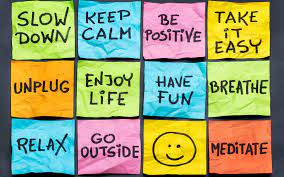Overcoming Test Anxiety
If you experience test anxiety, you are not alone! In fact, text anxiety is common in secondary education and advanced degree programs such as law school. While there are often underlying causes for anxiety, and test-related anxiety in particular, there are some coping mechanisms designed to help you succeed on exams whether it be here at school or for your jurisdiction’s bar exam.
Use your anxiety as a motivating factor: Research shows that a certain level of stress can help test-takers achieve because it is the body’s natural way of increasing attention, focus, and motivation. However, to reap the benefits, stress must be moderate. Thus, strive for balance so that your stress helps, not hurts you on an exam. Achieve more balance by celebrating what you can learn from your exam experience rather than focusing only on a score and by avoiding comparison to others around you. There are different journeys to success; make your own path and be true to it. Then, reward yourself and give yourself an incentive to finish. Having something to look forward to can make the anxiety of the exam easier to deal with.
Relaxation/Meditation: While it is common for law school students to promise themselves relaxation ‘after,’ (after I turn in my legal writing memo, after finals are over, after my moot court competition, after the bar exam…) we need to be practicing those important techniques before and during our testing periods as well. Set aside a few quite moments daily or weekly to allow yourself time to relax, focus, and become more mindful of all the non-law and non-school parts of our lives that also need attention. If traditional meditation is not for you, try breathing techniques, exercise, journaling, coloring, reading, walking, or listening to music.
Practice Self-Regulated Learning: Reach your academic goals though practice! Believe in your ability to achieve success by showing success. Practice testing is associated with improvements in test-taker performance because it affords low-stake opportunities to consider strategies such as what to do in your pre-writing phase to set a strong base for a successful answer. Moreover, practice will give you a sense of control over your performance because you will have seen and experienced the way questions can be asked and how they should be answered. Practicing enough will reduce test anxiety because it will feel as if you’ve taken the exam before and can anticipate what it will look and feel like to take it.
Making Use of Student Success: Working with the Office of Student Success can also help with test anxiety by helping you learn more about self-regulated learning and how you can best develop that skill and related strategies. Your Student Success team can also provide you with hypos and help you learn self-assessment skills to get the most out of your learning and practice. Learning and practice will also help you understand that exams (whether final exams in law school or the bar exam preparation period) require a marathon pace where cramming is not a viable option, and where it is important to maintain perspective. No one wants to focus on a ‘worst case’ scenario, but it does help to remember that your performance on an exam is not a life-or-death situation, nor does an exam score speak to your ability to become a successful attorney.
We will all experience stress and anxiety at points in our lives. It is how we deal with those stressors and how we perform in the face of anxiety that matters. Remember to have fun, focus on practice, and gain important perspective as you enter any testing situation so that you are in control of your test anxiety rather than letting it control you.

